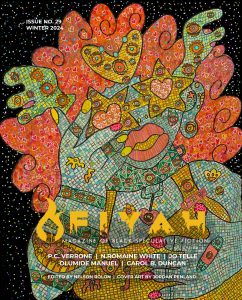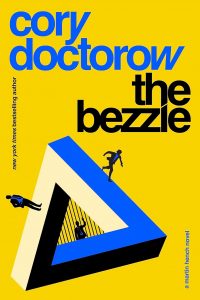Charles Payseur Reviews Short Fiction: Fiyah, Flash Fiction Online, GigaNotoSaurus, and Diabolical Plots
 Fiyah 1/24
Fiyah 1/24
Flash Fiction Online 1/24
GigaNotoSaurus 1/24
Diabolical Plots 1/24
The first Fiyah of 2024 is unthemed, but as guest editor Nelson Rolon describes, that doesn’t mean certain motifs and elements didn’t end up running through most or all of the pieces – most engaged with death and what comes after. In N. Romaine White’s “D.E.I. (Death, Eternity, and Inclusion)”, a group of vampires meet to discuss the future of their people and organization, and Carolyn, a more recently turned vampire who while alive was a movie executive fighting for racial justice, finds herself offered a leadership role in a new initiative that could be wonderful – or absolutely awful. White frames the story around what is basically a job interview, as Carolyn meets with the head vampire of a large and growing vampire population who wants to move his people into a more equitable future. The story is hilarious, showing Carolyn’s knowledge and skepticism of “diversity initiatives” that aren’t grounded in the principles of the work – that are only smoke and mirrors meant to give an illusion of justice without actually providing it. At the same time, the piece shows that this might indeed be an opportunity and that, given the right support, this might be a road forward for vampires that could really work. It’s fantastic. Jo Telle keeps the focus on the border between life and death in “Together Like Hands on a Clock”, which follows Raven, whose girlfriend Dee disappeared in Alaska while the two of them were on a kind of bucket-list trip following Dee’s diagnosis with a terminal illness. Despite the disappearance, though, Dee continues to return to the place in Alaska where they stayed, and Raven is left with a girlfriend who seems to only exist some of the time and in such a remote place that it puts a strain on their already-strained relationship. Telle does amazing work in teasing out the emotions swirling around this impossible situation, and finding in both Raven and Dee both stunning resilience and some deep flaws. The ending is a mix of heartbreak and bittersweet joy that reveals in the stark landscapes and brief but intense meetings something beautiful and foundational – an ending but also a new beginning.
Lora Gray returns to Flash Fiction Online with the chilling and gripping “The Pieces of Her”, which features Denise standing before her wife’s killer and legacy both in the body of a pilot AI that is supposed to revolutionize the possibilities for space travel. For Denise, though, the program has always frightened her, not because her wife made it but because of who she made it for – greedy executives don’t want anyone standing who might not approve of their plans for it. The prose is harrowing, violent, and a bit terrifying, and Gray contrasts that with the love and anger Denise experiences, the grief and sorrow and guilt. It’s a powerful read.
The January GigaNotoSaurus features E.A. Petricone’s “The Nine Lives of the Door Spirit”, a rather moving story about a reincarnating door spirit who begins his existence in the home of a coffin maker and his wife, an artist, and their daughter. It’s a rather blessed life to start, until it isn’t – until illness ravages their city and the door spirit learns despair and helplessness. And it’s a lesson he takes into his next lives as, angry and bitter, he lashes out against those he’s supposed to protect. The piece deals with trauma through the rather interesting lens of the door spirit, and show the difficult but often necessary journey back from jaded cruelty and to a place of trust and vulnerability again. Petricone finds in the door spirit a witness who, like the readers, is confronted with the very worst of humanity, but who ultimately doesn’t lose sight of compassion, hope, and love. It’s a grim piece at times, but one that resolves into warmth and possibility.
To close things out, after a few months with an altered publishing schedule, Diabolical Plots enters 2024 back on its usual game with two new stories, including “They Are Dancing” by John Stadelman, in which Vicky and Nash are racing time… in a literal sense. Driving across country from West Coast to East, they are trying to avoid the ending of their relationship despite the trip itself revealing deep fissures and faults in the connections and affections between them. But they cling to the comfort of what they’ve built even when it’s obvious they can’t avoid its end, making time itself their villain while their own stubbornness is what’s preventing them from facing the future. Stadelman focuses on memory as both a rich vein of strength and meaning while also showing how at times it can become an anchor weighing people down and keeping them from moving on. It’s a bittersweet story well told.
Recommended Stories
“D.E.I. (Death, Eternity, Inclusion)”, N. Romaine White (Fiyah 1/24)
“Together Light Hands on a Clock”, Jo Telle (Fiyah 1/24)
“The Nine Lives of the Door Spirit”, E.A. Petricone (GigaNotoSaurus 1/24)
Charles Payseur is an avid reader, writer, and reviewer of speculative fiction. His works have appeared in The Best American Science Fiction and Fantasy, Lightspeed Magazine, and Beneath Ceaseless Skies, among others, and many are included in his debut collection, The Burning Day and Other Strange Stories (Lethe Press 2021). He is the series editor of We’re Here: The Best Queer Speculative Fiction (Neon Hemlock Press) and a multiple-time Hugo and Ignyte Award finalist for his work at Quick Sip Reviews. When not drunkenly discussing Goosebumps, X-Men comic books, and his cats on his Patreon (/quicksipreviews) and Twitter (@ClowderofTwo), he can probably found raising a beer with his husband, Matt, in their home in Eau Claire, Wisconsin.
This review and more like it in the March 2024 issue of Locus.
 While you are here, please take a moment to support Locus with a one-time or recurring donation. We rely on reader donations to keep the magazine and site going, and would like to keep the site paywall free, but WE NEED YOUR FINANCIAL SUPPORT to continue quality coverage of the science fiction and fantasy field.
While you are here, please take a moment to support Locus with a one-time or recurring donation. We rely on reader donations to keep the magazine and site going, and would like to keep the site paywall free, but WE NEED YOUR FINANCIAL SUPPORT to continue quality coverage of the science fiction and fantasy field.
©Locus Magazine. Copyrighted material may not be republished without permission of LSFF.







